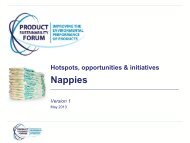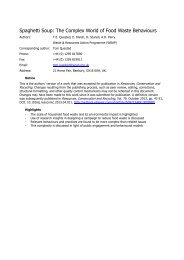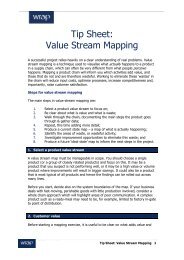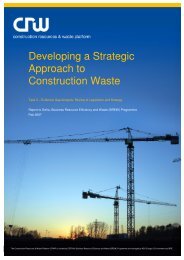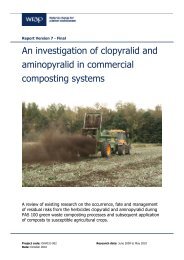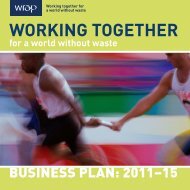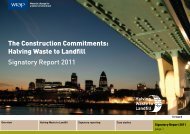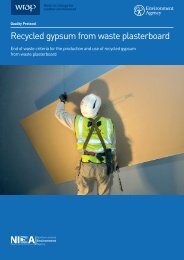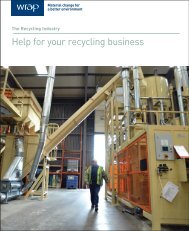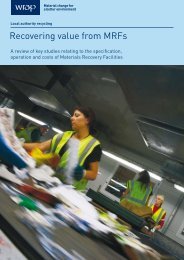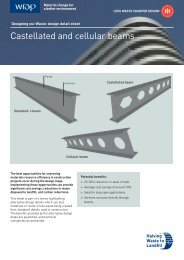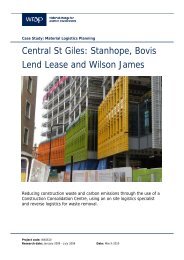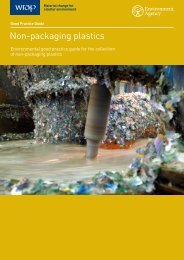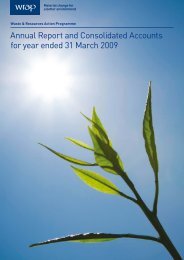Case study 6 - Doncaster - Wrap
Case study 6 - Doncaster - Wrap
Case study 6 - Doncaster - Wrap
You also want an ePaper? Increase the reach of your titles
YUMPU automatically turns print PDFs into web optimized ePapers that Google loves.
Bulky Waste Guidance: <strong>Case</strong> <strong>study</strong> 6 - <strong>Doncaster</strong><br />
Subcontracted bulky household waste<br />
collections: <strong>Doncaster</strong>
Bulky Waste Guidance: <strong>Case</strong> <strong>study</strong> 6 - <strong>Doncaster</strong><br />
Introduction<br />
The Mayor‟s Zero Waste Strategy was developed in 2004; a number of Zero Waste goals were<br />
included:<br />
• 75% of <strong>Doncaster</strong> households actively participating in recycling activities by end of 2008; and<br />
• at least 500 jobs will have been created/protected by the implementation of the strategy by the<br />
end of 2010.<br />
One of <strong>Doncaster</strong> Metropolitan Borough Council‟s (DMBC) key policies is to seek opportunities to work<br />
in partnership with others in the pursuit of their waste strategy. The council has been supportive of<br />
third sector partners who have played a key role in developing its waste management services.<br />
The first integrated waste (refuse and recycling) collection contract between DMBC and SITA GB Ltd<br />
started in 2003. SITA was contracted to collect all household waste including dry recyclables,<br />
compostable garden, bulky household and residual waste. <strong>Doncaster</strong> Refurnish was operating in the<br />
Borough before SITA was awarded the collection contract.<br />
Established in 2003, <strong>Doncaster</strong> Refurnish collects unwanted furniture and electrical appliances from<br />
households and businesses in <strong>Doncaster</strong> and surrounding areas. These resources are available to<br />
help people set up home in an economically sustainable way, reducing poverty and reliance on debt<br />
finance. In the process of collecting, re-using and recycling household items, <strong>Doncaster</strong> Refurnish<br />
provides a volunteering, work placement and training programme to those facing long-term<br />
unemployment, mental health issues and those disengaged from mainstream society.<br />
In 2009/10 it employed 37 people and provided flexible self-employment opportunities to nine others.<br />
It provides 133 volunteering placements, giving work-based and accredited training to socially<br />
disadvantaged people, thereby increasing their employability, self-esteem and skills.<br />
A new collection contract between DMBC and SITA started in October 2009. At the same time, SITA<br />
subcontracted <strong>Doncaster</strong> Refurnish to collect all bulky waste, including WEEE items, for six years.<br />
Key facts<br />
• The contract started in October 2009 and runs for 6 yrs.<br />
• A sub-contracted with the main contractor being SITA GB Ltd.<br />
• EU Procurement rules applied and a restricted procurement process was used.<br />
• Bulky waste collection is charged for.<br />
• Reuse rate: 65% (April 08 – Mar 09).<br />
• Tonnage diverted: 488 tonnes of bulky waste (April 08 – Mar 09).<br />
• Number of collections: 11,977 (April 08-Mar 09)<br />
• Disposal cost savings: £25,000 approx.<br />
• Low income households assisted: 4,264 with low cost furniture & household goods.<br />
2
Bulky Waste Guidance: <strong>Case</strong> <strong>study</strong> 6 - <strong>Doncaster</strong><br />
About <strong>Doncaster</strong><br />
• <strong>Doncaster</strong> is in South Yorkshire and covers 250 square miles.<br />
• It forms part of the largest metropolitan area outside London, and has a population of around<br />
291,100.<br />
• Predominately urban, 11 out of 21 wards are in the bottom 10% in the indices of multiple<br />
deprivation (IMD) in England.<br />
• <strong>Doncaster</strong> is a relatively deprived area, with more unemployed people than in other areas in<br />
Yorkshire and the Humber.<br />
• Earnings and skills levels are lower than the average in Yorkshire and the Humber and nationally.<br />
Background<br />
In October 2003 a reuse-only bulky waste service from households commenced. The original<br />
arrangement was the result of a series of meetings (over a period of two months) between major<br />
stakeholders:<br />
• DMBC Waste Management Head of Service;<br />
• DMBC Neighbourhood Renewal Fund (NRF) Manager;<br />
• SITA GB Ltd Contracts Manager; and<br />
• <strong>Doncaster</strong> Refurnish Strategic Development Manager.<br />
The objective was to explore and improve DMBC‟s social and environmental activities, and for<br />
<strong>Doncaster</strong> Refurnish to access greater quantities of reusable furniture and household goods.<br />
<strong>Doncaster</strong> Refurnish outlined how their work would assist other council departments (social services,<br />
the homeless section and the asylum team) to source affordable furniture for their clients, as well as<br />
providing an environmental service with the reuse and recycling of unwanted household furniture.<br />
The 2003 contract written by DMBC contained a clause giving the winning contractor the power to<br />
subcontract or reassign a proportion of the services required. SITA, as winning bidder, did not view<br />
the bulky collection as profitable, and it did not have a mechanism for reusing bulky waste. However,<br />
they were open to working with the community sector to achieve value for money for the Council.<br />
DMBC and SITA used this clause to assign responsibility for collecting reusable furniture to <strong>Doncaster</strong><br />
Refurnish. Refurnish was the only furniture reuse organisation in the borough with the capacity to<br />
reuse significant amounts of bulky waste.<br />
<strong>Doncaster</strong> Refurnish did not receive a formal contract at this point in 2003. The only legal security<br />
awarded to <strong>Doncaster</strong> Refurnish was the signature of DMBC‟s Head of Waste Services, at the foot of a<br />
letter that outlined the operational detail of the reuse service. Officially, <strong>Doncaster</strong> Refurnish was<br />
subcontracted by SITA, but there was no legal documentation which clearly stated the terms and<br />
conditions of this partnership between the two parties, such as the service, fees, key performance<br />
indicators (KPI) or get-out clauses.<br />
3
Bulky Waste Guidance: <strong>Case</strong> <strong>study</strong> 6 - <strong>Doncaster</strong><br />
However, DMBC made it contractually clear with the main contractor that any changes to the<br />
subcontracting assignment should first be approved by them, thereby offering some protection to<br />
<strong>Doncaster</strong> Refurnish regarding the continuation of their involvement in the reuse service. <strong>Doncaster</strong><br />
Refurnish invoiced SITA for the number of furniture reuse collections it made per month; SITA then<br />
invoiced DMBC.<br />
The service began as a six-month pilot with the approval of <strong>Doncaster</strong> MBC. In the six-month trial<br />
period, the performance targets, based upon <strong>Doncaster</strong> Refurnish capacity at that time, were met.<br />
These were:<br />
• the creation of 7 full time jobs;<br />
• increasing reuse in the borough by 20%; and<br />
• increasing the provision of affordable goods to local communities by 20%.<br />
The success of the trial was reliant on the receipt of Neighbourhood Renewal Funding (NRF). This<br />
money enabled recruitment of a contract manager, three drivers, three loaders, two additional 3.5<br />
tonne vehicles, insurance, transport costs, vehicle sign writing and marketing. The service was<br />
designed to receive calls through DMBC‟s call centre. Reusable collection requests were diverted to<br />
<strong>Doncaster</strong> Refurnish and waste collections through SITA.<br />
In order to support the trial, DMBC introduced a policy whereby reusable collections were free of<br />
charge to the resident but non-reuse collections were charged. SITA then paid <strong>Doncaster</strong> Refurnish a<br />
fee per collection on a monthly basis.<br />
The number of bulky reuse collection requests received by <strong>Doncaster</strong> Refurnish in the six-year period<br />
between 2003-2009 increased by 75%.<br />
<strong>Doncaster</strong> Refurnish monitored and evaluated its activities, including: the number of jobs,<br />
volunteering and training opportunities created; the number of collections completed; tonnage<br />
diverted from landfill; and the number of households accessing affordable goods. This enabled DMBC<br />
to easily identify the positive impact and outcomes the arrangement was having in the area.<br />
The strength of the partnership arrangement was tested during the 2007 floods in <strong>Doncaster</strong>. Many<br />
residents accessed the service in a short period of time, not only to obtain goods to replace those<br />
ruined in the floods, but also to donate to those who were needy. Although the workload increased<br />
dramatically, the service was still delivered to a high standard.<br />
2003/4 2004/5 2005/6 2006/ 2007/8 2008/9 Total<br />
Collections 2,021 6,206 11,977 14,993 14,329 11,977 61,503<br />
Tonnage Collected 176 518 878 930 801 706 3,833<br />
No. of Items 5,879 17,169 26,467 30,843 27,742 25,697 127,918<br />
Recycled/Reused<br />
(Tonnes) 79 238 457 605 551 488 2,339<br />
Recycling/Reuse<br />
Rate 40% 46% 52% 65% 69% 69%<br />
4
Bulky Waste Guidance: <strong>Case</strong> <strong>study</strong> 6 - <strong>Doncaster</strong><br />
Households<br />
receiving goods 1,341 1,900 2,248 3,787 4,068 4,262 17,606<br />
The approach<br />
In September 2008, twelve months before the existing waste management contract was due to<br />
expire, DMBC began to explore the possible social, environmental and economic improvements that<br />
could be made to its future bulky waste collection service, using <strong>Doncaster</strong> Refurnish performance as<br />
a benchmark. To ensure that these elements were considered, the council placed a requirement<br />
within the contract that successful bidders were to work with a third sector organisation on resource<br />
recovery, particularly in the area of reuse and recycling.<br />
A new, six-year integrated waste collection contract with a value of £5.7 million was tendered, with<br />
the option to extend for a further three years. Maximising reuse from the bulky household waste<br />
stream was a key priority. DMBC adopted a restricted procurement process.<br />
For information on procurement processes see `The Legal Framework for Local Authorities‟ which can<br />
be accessed through the main Bulky Waste Guidance webpage.<br />
SITA‟s contract was extended for another year to cover the scoping exercise and to ensure an<br />
uninterrupted collection service. DMBC‟s timetable for procurement was as follows:<br />
July 2008:<br />
Tender advertised on the Supplier and Contract Management System (SCMS)<br />
system and OJEU site<br />
August 2008: Deadline for Pre-Qualification Questionnaires (PQQ‟s)<br />
December 2008: Invitation to Tender (ITT) released.<br />
March 2009:<br />
Deadline for Tenders<br />
April 2009:<br />
Contract Awarded<br />
DMBC largely operates service-based procurement; departmental staff define the required services,<br />
and manage the procurement process with support from the procurement and legal team. All<br />
contracts are advertised on the Supply Contracts Management System (SCMS), a web-based supply<br />
and purchasing portal for Local Authorities.<br />
5
Bulky Waste Guidance: <strong>Case</strong> <strong>study</strong> 6 - <strong>Doncaster</strong><br />
Extract from the bulky household waste service specification<br />
• In order that the Council can assess Tenderers on the strength of their willingness to cooperate<br />
with this Clause it is required that each valid Tender contains a detailed plan of the<br />
proposal to achieve the Council‟s aims for regeneration and reuse of materials.<br />
• The award of the Agreement will be positively influenced by the inclusion in the Tender of a<br />
clear commitment to the provision of activities aimed at reusing materials where possible.<br />
Specifically Tenderers should outline their proposals for a furniture recycling programme<br />
that will ensure that unwanted furniture uplifted from properties will not be placed in landfill<br />
sites but will be repaired and re-introduced as a desirable consumer item at a competitive<br />
price. This ensures the reuse of goods meets with the Council‟s social inclusion objectives.<br />
Once the OJEU notice was published, <strong>Doncaster</strong> Refurnish commenced a three month exercise of<br />
presenting their credentials to nine waste management companies whom they assumed would be<br />
bidding for the contract.<br />
As <strong>Doncaster</strong> Refurnish could no longer rely upon grant funding in their bid, they priced their service<br />
on a full cost recovery basis over the six-year contract period, using a standard 3% inflationary price<br />
increase per annum. DMBC accepted the new full cost recovery model, and the suggested efficiency<br />
saving, which was the result of a change in the size of collection vehicles from 3.5 tonnes to 7.5<br />
tonnes.<br />
<strong>Doncaster</strong> Refurnish could demonstrate a six-year track record of collection, reuse and recycling of<br />
unwanted furniture and household goods; it was an Approved Authorised Treatment Facility (AATF)<br />
able to handle and process WEEE; and was an ISO 9001, 14001 and 18001 accredited organisation<br />
(certification obtained early 2009) and could therefore fulfil the requirement of DMBC for<br />
subcontractors to have QMS.<br />
In April 2009, SITA GB Ltd was awarded a new six-year household waste collection contract, with an<br />
optional extension of three years. The subcontract between SITA and <strong>Doncaster</strong> Refurnish, providing<br />
the full bulky household waste collection component, commenced in October 2009.<br />
Collections and fees<br />
The agreed payment fee is based on the cost of <strong>Doncaster</strong> Refurnish providing an estimated 22,000<br />
collection requests per annum. This figure was established by combining <strong>Doncaster</strong> Refurnish annual<br />
number of collections and those achieved by SITA.<br />
A set annual fee may result in financial losses for the collections operator if capacity exceeds service<br />
demand, steps were taken to reduce risks and liabilities.<br />
6
Bulky Waste Guidance: <strong>Case</strong> <strong>study</strong> 6 - <strong>Doncaster</strong><br />
• <strong>Doncaster</strong> Refurnish adopted a flexible operating structure, e.g. a percentage of the collection<br />
crew are temporary workers and premises lease break clauses have been negotiated to be a<br />
maximum of one month.<br />
• Marketing and partnership working are also key to maintaining participation and collection rates,<br />
and therefore DMBC ensures that it promotes a strong, on-going message about both reuse and<br />
the collection service that <strong>Doncaster</strong> Refurnish provides.<br />
TUPE - Transfer of Undertakings (Protection of Employment Regulations)<br />
TUPE rules applied because <strong>Doncaster</strong> Refurnish took on the whole bulky household waste (BHHW)<br />
collecting contract. As <strong>Doncaster</strong> Refurnish took on the extra 10,000 collections from SITA, two<br />
drivers and two loaders were employed by SITA to perform bulky collections. <strong>Doncaster</strong> Refurnish was<br />
legally obligated to employ these workers under TUPE regulations. In any event, they needed the<br />
additional two drivers and two loaders to meet the capacity needs of 10,000 extra collections.<br />
Key Performance Indicators (KPIs)<br />
The performance of <strong>Doncaster</strong> Refurnish subcontract is monitored by monthly key performance<br />
indicators (KPI‟s), such as: tonnage collected and recycling/reuse percentage;<br />
complaints/compliments; site inspections and maintenance reports; H&S records; site incident reports;<br />
missed collections; and participation rates.<br />
If the number of missed collections and complaints increases from previous years, <strong>Doncaster</strong><br />
Refurnish would need to justify this. If <strong>Doncaster</strong> Refurnish defaults, there are mechanisms to deal<br />
with this in the contract. If performance issues cannot be resolved satisfactorily, then <strong>Doncaster</strong><br />
Refurnish would be in breach of the agreement and the contract terminated. The contract would<br />
continue without reuse.<br />
Conclusions<br />
• A combination of the main contractor having the freedom to subcontract and social clauses in<br />
the contract set the framework for the recycling and reuse of bulky waste within an integrated<br />
collection contract. This meant that SITA, the main contractor, did not specifically need<br />
agreement from the council to subcontract, because the tender invitation was clear that<br />
subcontracting would be allowed.<br />
• After many years of a low cost recycling and reuse service, <strong>Doncaster</strong> MBC (DMBC) realised that<br />
to continue there would be an increased cost to the council. However, the social and<br />
environmental return on investment, and the value for money obtained, were considered as<br />
important as the immediate financial cost to the council.<br />
7
Bulky Waste Guidance: <strong>Case</strong> <strong>study</strong> 6 - <strong>Doncaster</strong><br />
• The bulky household waste collections contract has brought stability to <strong>Doncaster</strong> Refurnish and<br />
provides an additional platform for sustainable growth. This has brought wealth into the local<br />
economy.<br />
• It is inadvisable to operate without a formal contract, but building relationships with third sector<br />
organisations was vital to DMBC. The relationship during the period 2003-2009 was based upon<br />
trust, service performance, determination, and political will by council members, and support by<br />
officers and SITA staff.<br />
Key learning points<br />
1. Consider how the service is to be funded<br />
In 2003, DMBC had not accounted for the support costs that were necessary for starting a bulky<br />
waste reuse service. As the availability of funding diminished over the years, full cost recovery<br />
pricing was required.<br />
For more information see „What is the difference between a contract and a grant?‟ in<br />
Commissioning and Procurement which can be accessed through the main Bulky Waste Guidance<br />
webpage.<br />
2. Specify Quality Management Certification<br />
To establish assurances about the reliability and procedures of prospective TSO contractors specify<br />
that the successful organisation has ISO 9001, or equivalent, accredited certification is an option.<br />
3. Contract specification and Short Term Flexibility<br />
DMBC specified 22,000 BHHW collections per annum, and it was more efficient to design the<br />
service utilising 7.5 tonne vehicles rather than the 3.5 tonne vehicles used by <strong>Doncaster</strong> Refurnish.<br />
This difference proved time consuming and costly:<br />
• Someone within the TSO had to obtain a Certificate of Professional Competence (CPC) before<br />
the full licence is awarded. <strong>Doncaster</strong> Refurnish applied for the licence in June 2009 with a view<br />
to securing an operator‟s licence before the contract start date of 5th October 2009.<br />
• Unexpectedly, it took 10 months and a formal hearing before an interim licence was granted<br />
(March 2010). The application was held with the Traffic Commissioner for months because of<br />
their failure to understand that a TSO could be both a charity and a social enterprise.<br />
• This stretched the organisation‟s operating capacity because the contract was delivered using<br />
3.5 tonne vehicles for the first six months of the contract.<br />
Building in some short-term flexibility on service provision and delivery methods would have aide<br />
the situation.<br />
4. Centralised vs. Decentralised Procurement<br />
For DMBC, using service-based procurement meant that there was an appropriate waste<br />
management and community-facing champion within the Council, who believed in furniture reuse,<br />
8
Bulky Waste Guidance: <strong>Case</strong> <strong>study</strong> 6 - <strong>Doncaster</strong><br />
and recognised the social and environmental benefits that engagement with a TSO partner would<br />
bring to the local community.<br />
Quotes<br />
“It is about being clear about the aims of the procurement process from the beginning. The<br />
authority wanted a reuse service because of the social, environmental and economic value that<br />
it brings. The wording of the Invitation to Tender reflected this...unless it is stated explicitly in<br />
the tender documentation it will not happen. Also regulations are not a barrier to engaging<br />
different stakeholders in the delivery of authority objectives, as we have clearly shown in<br />
<strong>Doncaster</strong>, it‟s about seeing the bigger picture and making it happen”.<br />
Jane Butler, DMBC Resource Recovery Manager<br />
“All of the waste collected by <strong>Doncaster</strong> Refurnish would ordinarily go to landfill, but due to<br />
this partnership, waste is being recovered to provide much needed assistance to those that<br />
need it most. This is a truly effective alternative that is providing significant social,<br />
environmental and economic benefits”.<br />
Victor Ross, Contract Manager, SITA GB Ltd<br />
Contact<br />
Contact<br />
Jane Butler<br />
Resource Recovery Manager<br />
<strong>Doncaster</strong> Metropolitan Borough Council<br />
E-mail: jane.butler@doncaster.gov.uk<br />
Tel: 01302 734444<br />
Web: www.doncaster.gov.uk<br />
Jo Ward<br />
Former CEO<br />
<strong>Doncaster</strong> Refurnish<br />
E-mail: ward.joanne@ymail.com<br />
Tel: 07760 194739<br />
9
Bulky Waste Guidance: <strong>Case</strong> <strong>study</strong> 6 - <strong>Doncaster</strong><br />
While steps have been taken to ensure its accuracy, WRAP cannot accept responsibility or be held liable to any person for loss<br />
or damage arising out of or in connection with this information being inaccurate, incomplete or misleading. This material is<br />
copyrighted. It may be reproduced free of charge subject to the material being accurate and not used in a misleading context.<br />
The source of the material must be identified and the copyright status acknowledged. This material must not be used to<br />
endorse or used to suggest WRAP‟s endorsement of a commercial product or service. For more detail, please refer to our<br />
Terms & Conditions on our website: www.wrap.org.uk<br />
www.wrap.org.uk/la<br />
10



